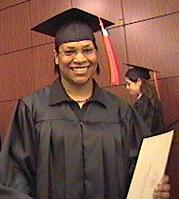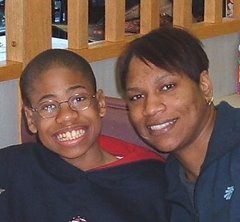nytimes.com
April 4, 2006
By Gretchen Cook
When he was growing up in Oregon, Graham Seaton found it virtually impossible to bring children home from school to play.
"I knew there was something wrong with my place," he recalled. "But I didn't know how to explain what that was."
He knew that he would have to tell his friends why they could play only in his bedroom — and only with the door locked. And that, ultimately, he would have to explain what was "wrong" with his older brother Burleigh, who is profoundly autistic.
"I just didn't have the words," he said.
Now 30, Mr. Seaton said he realized that as a child, he felt he could not ask his parents for those words.
"I was so aware I couldn't make a big deal with my family," he said. "My parents already had enough on their hands."
An estimated seven million "typically developing" American children have siblings with disabilities, according to the Arc of the United States, a leading advocacy group for the mentally retarded. Those children face many of the same challenges — and joys — as their parents, but they also face other problems. Some resent the extra demands placed on them at an early age by their disabled siblings, and many feel neglected by their often overburdened parents.
Some children say they fear "catching" their siblings' disabilities. Others may wish that they, too, were disabled, so that they could get all the attention their siblings do. And many suffer embarrassment about their siblings' inappropriate behavior or abnormal appearance, and then feel guilty about it.
Read full article at: http://www.nytimes.com/2006/04/04/health/04sibs.html?_r=1&oref=slogin
For information, resources, practical strategies on autism please visit:
www.AutismConcepts.com
www.child-autism-parent-cafe.com
Forget what you haven't heard… Family site shares news, resources, announcements and free or low-cost ways to help us manage day-to-day living with autism.
Crystal Brown

About Me

- Crystal
- AutismConcepts.com and Child-Autism-Parent-Cafe.com share a large collection of useful autism information, resources, and how-to articles written by authors who are touched by autism, offering practical solutions to families. Particularly minority and underserved families and caregivers who may not know what to do or where to go for help.
MJ And Me

Blog Archive
-
▼
2006
(213)
-
▼
April
(20)
- Study: Autism Has High Costs to U.S. Society
- Tutorial, Access To Care For People With Disabilities
- Autism - Worst Welfare Disaster In History
- Treatment involves repeated exercises
- Guardianship News
- Face Reader Bridges Autism Gap
- 20 Parent Tips To A Tantrum-Free Haircut For A Chi...
- Repetitive Self-Injurious Behavior: The Emerging P...
- GRACE (VA) Co-Sponsors Free Program for Autism Awa...
- Help for Siblings of Children with Special Needs
- Brain Scans Help Explain Autistic Traits
- Parents of Autistic Kids March Against Mercury
- Study Denouncing Autism Epidemic Misses the Mark; ...
- Increase Autism Awareness with Build A Bear Workshop
- Siblings of Disabled Have Their Own Troubles
- The Age of Autism: Mercury Ban Opposed
- Insurance and autism
- The Age of Autism: Hot potato on the Hill
- Wrightslaw Special Education Law and Advocacy Trai...
- The alienating 'hello'
-
▼
April
(20)